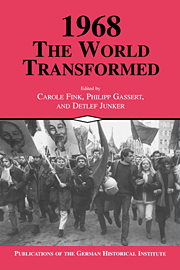Book contents
- Frontmatter
- Introduction
- Part One Tet and Prague: The Bipolar System in Crisis
- 1 Tet and the Crisis of Hegemony
- 2 Tet on TV
- 3 The American Economic Consequences of 1968
- 4 The Czechoslovak Crisis and the Brezhnev Doctrine
- 5 Ostpolitik: The Role of the Federal Republic of Germany in the Process of Détente
- 6 China Under Siege
- Part Two From Chicago to Beijing: Challenges to the Domestic Order
- Part Three “Ask the Impossible!”: Protest Movements of 1968
- Epilogue
- Index
5 - Ostpolitik: The Role of the Federal Republic of Germany in the Process of Détente
Published online by Cambridge University Press: 05 January 2013
- Frontmatter
- Introduction
- Part One Tet and Prague: The Bipolar System in Crisis
- 1 Tet and the Crisis of Hegemony
- 2 Tet on TV
- 3 The American Economic Consequences of 1968
- 4 The Czechoslovak Crisis and the Brezhnev Doctrine
- 5 Ostpolitik: The Role of the Federal Republic of Germany in the Process of Détente
- 6 China Under Siege
- Part Two From Chicago to Beijing: Challenges to the Domestic Order
- Part Three “Ask the Impossible!”: Protest Movements of 1968
- Epilogue
- Index
Summary
the meaning of ostpolitik in a period of transition
During the late 1960s and early 1970s, the Federal Republic of Germany (FRG) underwent considerable societal and political change. This change was a result of the willingness of elites to introduce reforms and the pressures exerted on the system by “sixty-eighters.” Whereas the 1950s had been the first founding era in the country's history, the following period experienced a second “founding,” one that included domestic reforms, changes in attitudes, and new approaches to foreign affairs. During this time, the Federal Republic also came to terms with the postwar order and accepted its identity as a separate West German state. Ostpolitik, or the official policy toward Eastern Europe, became the best-known symbol of this accommodation to the realities created by World War II. This policy not only belatedly recognized Soviet hegemony in Eastern Europe, but it also, as I argue in this chapter, signaled the moment when the FRG began to play a new role in international affairs. Because of the relative decline of the superpowers, West Germany acquired a new status and became one of the driving forces behind detente, an effort that the superpowers alone could not have sustained. Furthermore, it was very much in the Federal Republic's national interest to transform the existing Cold War pattern in East-West relations. Thus, this era marked the beginning of a new phase in West Germany's foreign relations, which culminated in the events of 1989-90.
- Type
- Chapter
- Information
- 1968: The World Transformed , pp. 173 - 192Publisher: Cambridge University PressPrint publication year: 1998

